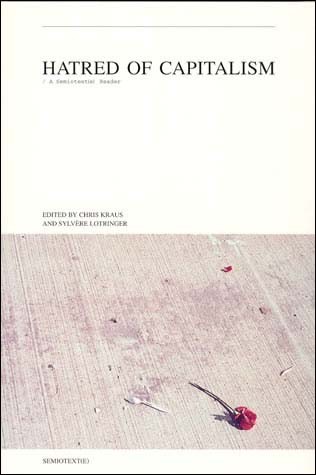Chris Kraus, Sylvère Lotringer (eds.): Hatred of Capitalism: A Reader (2001)
Filed under book | Tags: · activism, capitalism, cultural resistance, philosophy, subjectivity, theory

“Compiled in 2001 to commemorate the passing of an era, Hatred of Capitalism brings together highlights of Semiotext(e)’s most beloved and prescient works. Founded by French theorist and critic Sylvère Lotringer as a scholarly journal in 1974, Semiotext(e) quickly took on the mission of melding French theory with the American art world and punk underground. Its Foreign Agents, Native Agents, Active Agents and Double Agents imprints have brought together thinkers and writers as diverse as Gilles Deleuze, Assata Shakur, Bob Flanagan, Paul Virillio, Kate Millet, Jean Baudrillard, Michelle Tea, William S. Burroughs, Eileen Myles, Ulrike Meinhof, and Fanny Howe. In Hatred of Capitalism, editors Kraus and Lotringer bring these people together in the same volume for the first time.”
Assistant editors: Shannon Durbin and Tessa Laird
Publisher Semiotext(e), Los Angeles, 2001
Double Agents series
ISBN 1584350121, 9781584350125
421 pages
Review: Brian Dillon (Mute, 2002).
Interview with editor (Leo Edelstein, Log, 2001).
PDF (12 MB, updated on 2019-2-25)
Comment (0)Brian Massumi: A User’s Guide to Capitalism and Schizophrenia. Deviations from Deleuze and Guattari (1992)
Filed under book | Tags: · abstract machine, body without organs, capitalism, marxism, philosophy, politics, psychoanalysis

A User’s Guide to Capitalism and Schizophrenia is a playful and emphatically practical elaboration of the major collaborative work of the French philosophers Gilles Deleuze and Felix Guattari. When read along with its rigorous textual notes, the book also becomes the richest scholarly treatment of Deleuze’s entire philosophical oeuvre available in any language. Finally, the dozens of explicit examples that Brian Massumi furnishes from contemporary artistic, scientific, and popular urban culture make the book an important, perhaps even central text within current debates on postmodern culture and politics.
Capitalism and Schizophrenia is the general title for two books published a decade apart. The first, Anti-Oedipus, was a reaction to the events of May/June 1968; it is a critique of “state-happy” Marxism and “school-building” strains of psychoanalysis. The second, A Thousand Plateaus, is an attempt at a positive statement of the sort of nomad philosophy Deleuze and Guattari propose as an alternative to state philosophy.
Publisher MIT Press, 1992
ISBN 0262132826, 9780262132824
229 pages
PDF (updated on 2012-7-24)
Comments (2)Slavoj Žižek: Living in the End Times (2010)
Filed under book | Tags: · apartheid, biotechnology, capitalism, communism, ecology, financial crisis, genetics, intellectual property, philosophy, political economy

There should no longer be any doubt: global capitalism is fast approaching its terminal crisis. Slavoj Zizek has identified the four horsemen of this coming apocalypse: the worldwide ecological crisis; imbalances within the economic system; the biogenetic revolution; and exploding social divisions and ruptures. But, he asks, if the end of capitalism seems to many like the end of the world, how is it possible for Western society to face up to the end times? In a major new analysis of our global situation, Slavok Zizek argues that our collective responses to economic Armageddon correspond to the stages of grief: ideological denial, explosions of anger and attempts at bargaining, followed by depression and withdrawal.
After passing through this zero-point, we can begin to perceive the crisis as a chance for a new beginning. Or, as Mao Zedong put it, “There is great disorder under heaven, the situation is excellent.” Slavoj Zizek shows the cultural and political forms of these stages of ideological avoidance and political protest, from New Age obscurantism to violent religious fundamentalism. Concluding with a compelling argument for the return of a Marxian critique of political economy, Zizek also divines the wellsprings of a potentially communist culture—from literary utopias like Kafka’s community of mice to the collective of freak outcasts in the TV series Heroes.
Publisher Verso, 2010
ISBN 184467598X, 9781844675982
Length 416 pages
PDF (no OCR; updated on 2012-4-15)
Comment (0)
